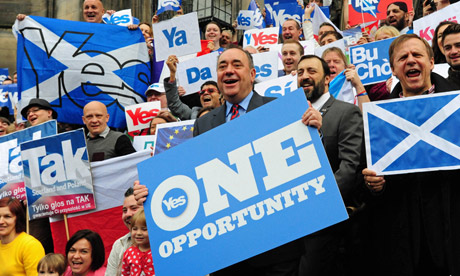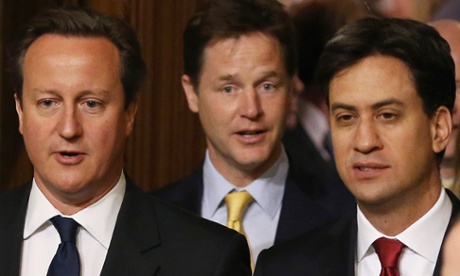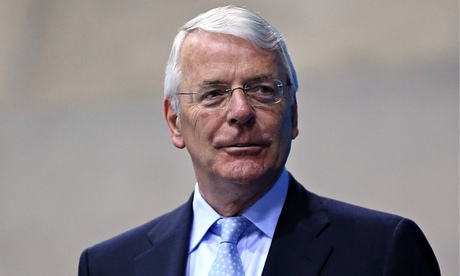The United Kingdom faces the "disastrous" prospect of losing its Trident nuclear deterrent and its permanent seat on the United Nations security council if Scotland votes for independence, the former prime minister Sir John Major has warned.
As the leaders of the UK's three main political parties arrived in Scotland to attempt stop a haemorrhage of votes for independence, Major said the UK would be a weaker global force after a yes vote.
The former prime minister, who campaigned unsuccessfully against the creation of the Scottish parliament in the 1997 general election, also warned that a yes vote in Scotland would encourage moves towards independence in Wales. "We would almost certainly find increased demand for independence in Wales," he told the Today programme on BBC Radio 4.
Major spoke out as David Cameron, Ed Miliband and Nick Clegg cast aside partisan Westminster politics to travel to Scotland to make an impassioned collective appeal to Scotland to vote to stay inside what they will say be a changed United Kingdom.
The prime minister, instinctively a unionist throughout his political career, told the people of Scotland that the rest of the UK was "desperate" for them not to break away. In a Daily Mail article Cameron wrote: "The United Kingdom is a precious and special country. That is what is at stake. So let no one in Scotland be in any doubt: we desperately want you to stay; we do not want this family of nations ripped apart."
 Alex Salmond on the campaign trail in Edinburgh on Tuesday. Photograph: Ken Jack/Demotix/Corbis
Alex Salmond on the campaign trail in Edinburgh on Tuesday. Photograph: Ken Jack/Demotix/Corbis
Major made a similarly impassioned plea for Scotland not to vote for independence next Thursday, claiming the SNP was hiding from the dangers of uncertainty over their currency. He said: "They are being offered further substantial devolution [by the UK parties]. But the step beyond that of becoming a separate nation opens up a whole series of particular problems that the SNP have glossed over and that the people in Scotland need to know.
"This is not a temporary change, this is forever."
The former prime minister went further than Cameron as he outlined the impact an independent Scotland would have on the standing of the remainder of the UK in the world. He said the UK would lose the Trident nuclear deterrent, which is based in Scotland, and would struggle to keep its permanent seat on the UN security council.
Major told the Today programme: "If Scotland voted to leave it would be disastrous for the whole of the UK. Firstly because Trident is in Scotland our defence would be imminently weakened. There are a lot of Scots in the British army. We would lose Trident, which has been our protection for a long time. If we lost Trident not to an enemy but to the actions of a neighbour – that would be just extraordinary.
"Our role in Nato would be reduced. Our relations consequently with the US would be damaged. The United Kingdom would be weaker in every international body it attends. It would certainly be weaker in the EU in the forthcoming negotiations. We would lose our seat at the top table in the UN."
 David Cameron, Nick Clegg and Ed Miliband have presented a united front before Scotland goes to the polls. Photograph: Dan Kitwood/AFP/Getty Images
David Cameron, Nick Clegg and Ed Miliband have presented a united front before Scotland goes to the polls. Photograph: Dan Kitwood/AFP/Getty Images
Cameron has been wary of spelling out the impact of a yes vote on the remainder of the UK for fear of playing into the hands of the SNP. But the remarks by the last Tory prime minister, who rarely makes high-profile interventions without the blessing of Downing Street, highlights the deep concerns at the highest levels of Whitehall about the wide-ranging impact of a yes vote.
Major said the referendum – regardless of the result – would change the governance of the rest of the UK, which would move to a "quasi-federalist system".
The former prime minister said both a yes or no vote would lead to calls for greater devolution in the rest of the UK. He said: "Both of those are going to feed a demand for more devolution to the English and Welsh regions – the north east, north west, Birmingham and Wales. That is going to have quite a lot of constitutional implications that we are going to have to deal with. We are moving inexorably towards a quasi-federalist system as a result of the extent of devolution."
Alex Salmond, the first minister of Scotland, claimed the Westminster establishment was "in a total and utter panic" as its campaign disintegrated. He described the visit of the three UK party leaders as "the biggest blunder of the campaign".
But Alistair Darling, the leader of the Better Together campaign, sought to step up the pressure on Salmond as he contrasted the speed with which more devolved powers would be implemented with the "years of wrangling" that would result after a yes vote.
The former chancellor told BBC Radio Scotland's Good Morning Scotland: "People have to choose between the certainty, the safety, the speed of change, which everybody wants, as opposed to a leap into the unknown where we still don't know the answers to some pretty basic questions."
Asked specifically about the differences between the three main parties on income tax, Darling insisted that the parties were "not that far apart". He denied that last-minute statements from the pro-union side were anti-democratic when many voters had already returned their postal ballots.
He said that the no campaign had given voters "a very clear picture of a Scottish parliament that will have more power than most federal governments in western Europe".
The unprecedented cooperation across the Westminster divide exposes the fear in London that Scottish voters are not heeding the jitters in the financial markets or dark warnings about the irreversible risks to the Scottish economy entailed in a yes vote next week.
The three leaders arrive a day after Mark Carney, the governor of the Bank of England, warned that a currency union was "incompatible with sovereignty", rejecting Salmond's claim that Scotland could share the pound and become an independent nation. The governor set out three elements necessary for a successful currency union: free movement of capital, a banking union, and joint fiscal arrangements over tax and spending.
The currency debate is being watched closely by financial markets, along with the approach that would be taken by the banking industry in the event of a yes vote. Analysts at Credit Suisse said Scotland would fall into a deep recession in the event of a yes vote. "We think deposit flight is both highly likely and highly problematic," they said, pointing out that Scotland's bank assets were 12 times GDP.
Buckingham Palace released a statement saying the outcome of the independence referendum was "a matter for the people of Scotland". The Queen is in Balmoral, where she will stay until after the vote on 18 September. The palace statement came after Salmond suggested she would be "proud to be Queen of Scots" and the Sunday Times said she had a "great deal of concern" about a yes vote.























